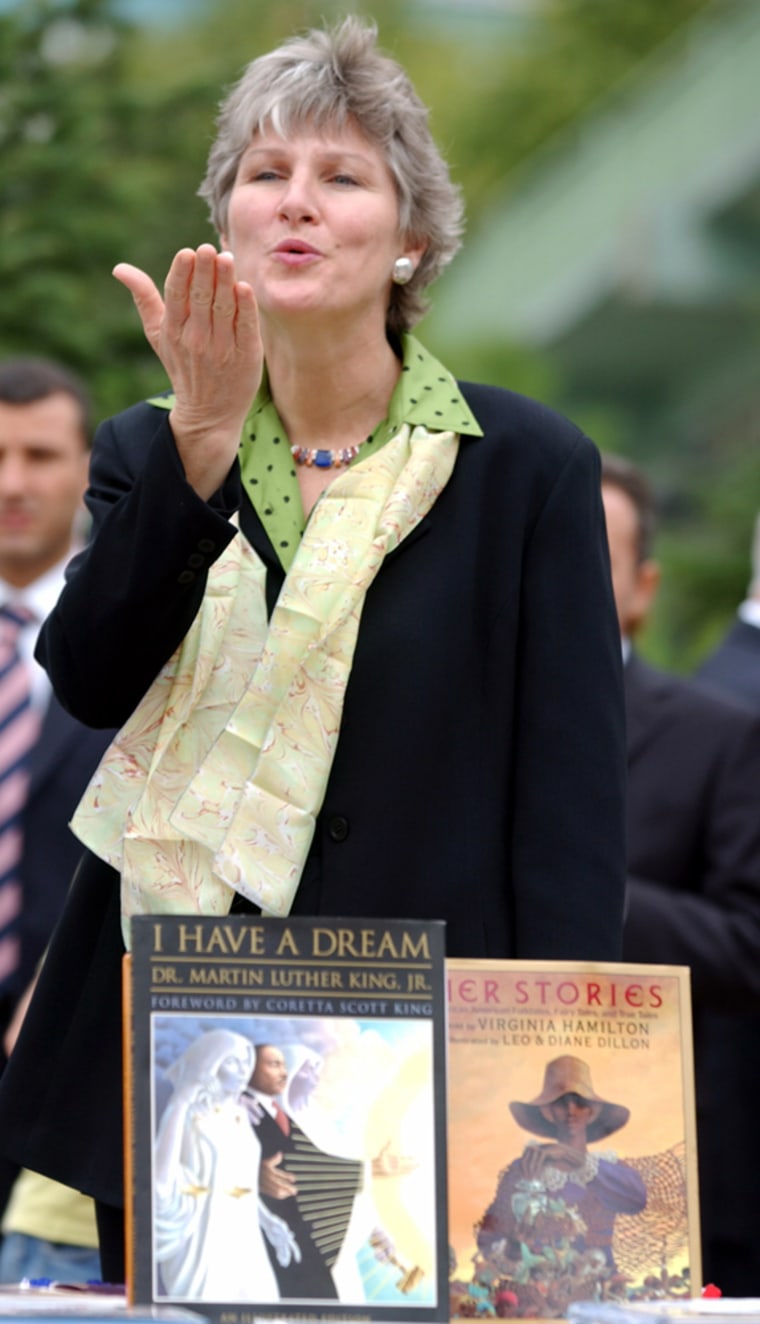Best known for her behind-the-scenes work as President Bush's former message master and adviser, Karen Hughes stepped out in a new role this week — taking on the tall task of improving America's image abroad.
Hughes, recently anointed as Undersecretary of State for Public Diplomacy, visited Egypt, Saudi Arabia and Turkey on a "listening tour" to hear from citizens of the mostly Muslim countries about their views of America.
Hughes close identification with the president has given her a major advantage in taking on the new task: publicity. Her stops in Cairo, Jeddah, Ankara and Istanbul had the feel of presidential visits, complete with police escorts, stopped traffic, high level meetings and a media hoard tracking her every move.
Unusually for an undersecretary of state, Hughes was met in each country by a large number of press, who covered her events with religious leaders, university students, women's groups and opinion leaders with gusto.
Hearing criticism
Hughes heard a range of opinions and at times was met with some harsh criticism for U.S. policies, especially its invasion of in Iraq.
At a discussion with female non-governmental organization (NGO) leaders in the Turkish capital, Ankara, Hughes made few comments as woman after woman told her they felt the war was unnecessary and that it erases the impact of anything positive the U.S. does.
"No one likes war,” she said later. “And that's been one of those things that I've tried to explain here this week: that Americans are concerned about war, too — even when we feel it's the right thing.”
With Americans still fighting in Iraq she admitted that adjusting attitudes toward the U.S. was an uphill struggle. "I never expected that I'd come here and take someone who was opposed to what we're doing in Iraq and change their mind,” she said.
"Palestinian issue"
Another challenge facing Hughes was anger at U.S. backing for Israel, especially as it relates to the Palestinian conflict.
A young university student in Egypt told Hughes that inevitably the "first thing mentioned" during discussions about the United States is its strong support for Israel. Meanwhile, Dr. Abdul Aziz al-Nahari, a Saudi journalist attending a luncheon with Hughes, said progress on the "Palestinian issue" would solve a lot of the image problems of the U.S.
Hughes, ever the disciplined messenger, tried to smooth waters by repeating over and over throughout the region that Bush is the first U.S. president to have called for an independent Palestinian state.
Complaints about Israel, of course, came as no shock; Hughes she said she was surprised, though, by how perceptions are created. "I was struck,” she said, “by how much the way people here in this region look at America is shaped by the way they think America sees them.”
In Cairo an Egyptian journalist told Hughes, "We are peace-loving people.… We are not terrorists."
And at a Saudi Arabian woman's college in Jeddah, the students told Hughes they were upset with how they feel they are portrayed in the American news and entertainment media.
One woman told Hughes she believed the "general image is the Arab woman isn't happy" and insisted that Arab women are happy, which earned a round of applause.
"Huge challenge"
In an interview with NBC News, Hughes said such comments were part of a "a huge challenge” in turning around America’s mostly negative image in the region.
She said she plans to brief the president and Congress about her trip, starting Friday morning with a visit to Senator Russell Feingold, a Democrat who has been working with Hughes on her public diplomacy efforts.
As for her report back to the White House, she said that instead of specific policy suggestions, she will focus on "perspective" and the importance of bringing the views of other countries into meetings. She dismissed, however, any notion that there was a lack of perspective on the part of the administration in the run-up to the Iraq war, arguing that the president routinely heard the viewpoints of other leaders.
But will bringing in the views of other countries really influence U.S. policy? Hughes is making no promises.
"It might have an impact in how we develop the policy,” she said. “It might mean we need to reach out and discuss … and it might not.
“It might be that we have to decide that this is important, as in the case of Iraq … that we have to act, even though we know some people will disagree with us.”
Such discussions are, of course, Hughes’ stock in trade. She says, though, that some aspects of her new role have yet to fully sink in.
"I still have to pinch myself a little when I'm sitting in a meeting with the King and realize that I'm there representing our country."
